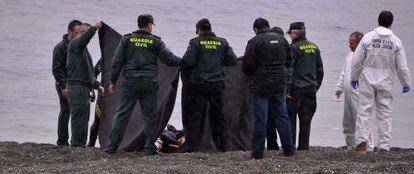The Civil Guard covers a body on the beach of Tarajal, in February 2014.J. Sánchez
The Constitutional Court will take to full the decision on the definitive file or not of the investigation into the tragedy of El Tarajal, in which 15 immigrants died when they tried to swim to Ceuta. The matter has been dealt with in the fourth section of the court, which has agreed to raise it to the Second Chamber, so that this, in turn, invokes it to the plenary, given the constitutional relevance of the case and its social interest, given the great debate that the facts provoked. In the fourth section there was no unanimity on the possible admission to processing of the appeal for amparo presented and therefore it was sent to the second chamber, where according to court sources it is certain that it will pass the filter, so that it is admitted and sent to the plenary, where the case will be studied again to decide if the archiving of the investigations and their possible insufficiency have meant an infringement of the rights of immigrants.
The appeal for amparo that is now going to be admitted for processing was raised by the NGOs Association for Human Rights of Spain (APDHE), the Spanish Commission for Refugee Aid (CEAR-Refugio) and the Coordinator of Neighborhoods, who consider that the investigation was closed falsely and with violation of fundamental rights of immigrants trying to reach Tarajal beach, and of those who survived.
The events occurred on February 6, 2014, when more than 200 immigrants tried to swim to the beach of Ceuta and were repelled by 56 agents of the Civil Guard deployed on the coast, who threw 145 rubber bullets and five smoke canisters. 15 of the migrants, most of whom came from sub-Saharan Africa, lost their lives. Another 23 members of the group achieved their goal of reaching Ceuta territory, but were immediately returned to Morocco, in one of the so-called "hot expulsions".
On what happened, a judicial investigation was opened that has known various avatars. At first, 16 agents were charged with the alleged crime of homicide by recklessness, but the case was archived when the judge of the Court of Instruction Number 6 of Ceuta concluded that the use made of the material used to repel immigrants was not objectionable. The aforementioned NGOs appealed this decision and the Audiencia de Ceuta reopened the investigation, which was closed again in 2020. There was a new challenge to what was agreed, this time before the Supreme Court, which rejected the appeal for cassation filed.
All this allowed the presentation of the amparo lawsuit that will soon reach the plenary session of the Constitutional Court, which in turn will request new reports on the case, after a first debate in the aforementioned fourth section of the court, where there was no consensus on the admissibility of the appeal. This section is composed of three judges, María Luisa Balaguer, Ramón Sáez and Enrique Arnaldo. The first two belong to the progressive sector of the guarantee body and the third to the conservative bloc.
Judges Balaguer and Sáez expressed their support for admissibility, and Judge Arnaldo expressed his desire to present a separate opinion against. To this end, he proposed that the matter be dealt with in the body superior to the aforementioned section, the second chamber of the court, and this was agreed. The admission is taken for granted in the court itself since the aforementioned chamber is composed of four progressive and two conservative judges.
In addition to Balaguer and Sáez, magistrates Inmaculada Montalbán, who presides over it, as vice president of the court, and Laura Díez, of the progressive group, are part of this section. And in addition to Arnaldo, Judge César Tolosa, from the conservative sector, belongs to this court. The referral to the second chamber implies that the decision on whether or not to admit it must be in the nature of an order, which in turn will allow the judge who voted against, Enrique Arnaldo, to present in writing the reasons for his disagreement, in a separate opinion. Court sources estimate that the course followed by the first debate on the case in the body of guarantees suggests that there will be no unanimity on the merits of the matter in the plenary session.
Along with this first request for amparo of the aforementioned NGOs, the Constitutional Court has pending the admission or not to process another appeal, presented by relatives of the deceased. In their challenge they raise not only their opposition to the archiving of the investigations, but also that the necessary measures be adopted so that the mortal remains of the immigrants who lost their lives in the attempt to swim to the Tarajal beach are delivered to them.
The sources consulted in the court of guarantees consider that in all probability the two resources will be joined to be processed in a rhythmic manner, given the link between both demands. However, it is not certain that the case of the relatives is now admissible, because it has not yet been examined by any section of the court. Some magistrates of the progressive sector are going to propose that the two resources be joined as soon as possible, because of their obvious material connection and for reasons of humanity and attention to the families of the deceased.
Subscribe to continue reading
Read without limits
Read more
I'm already a subscriber

